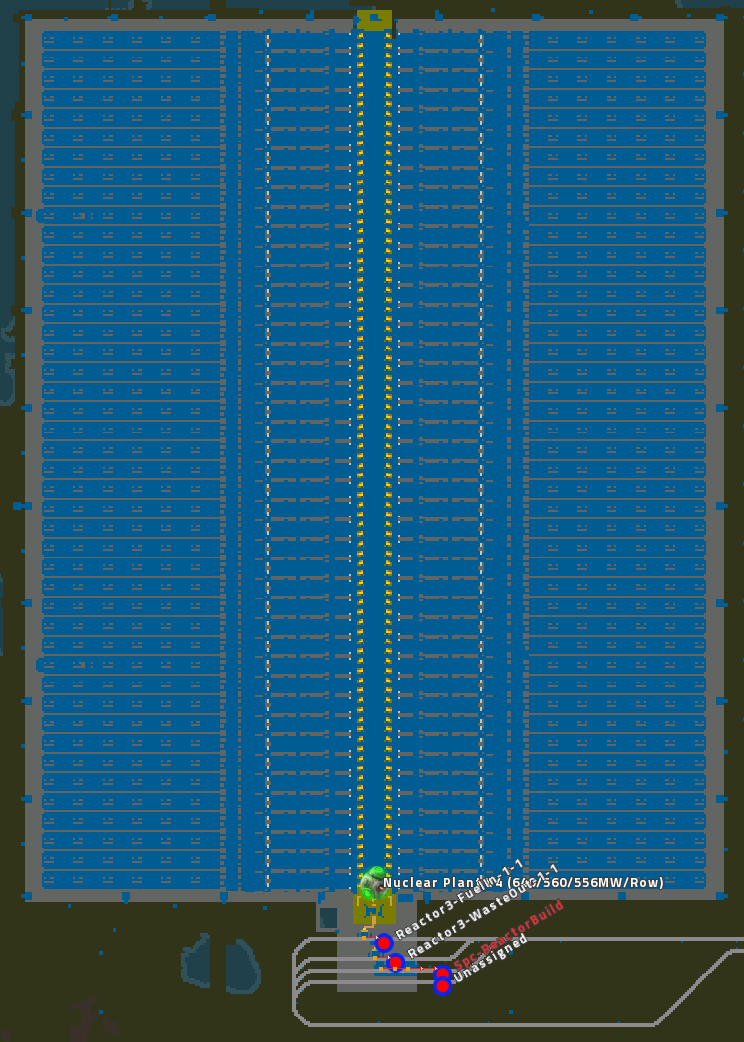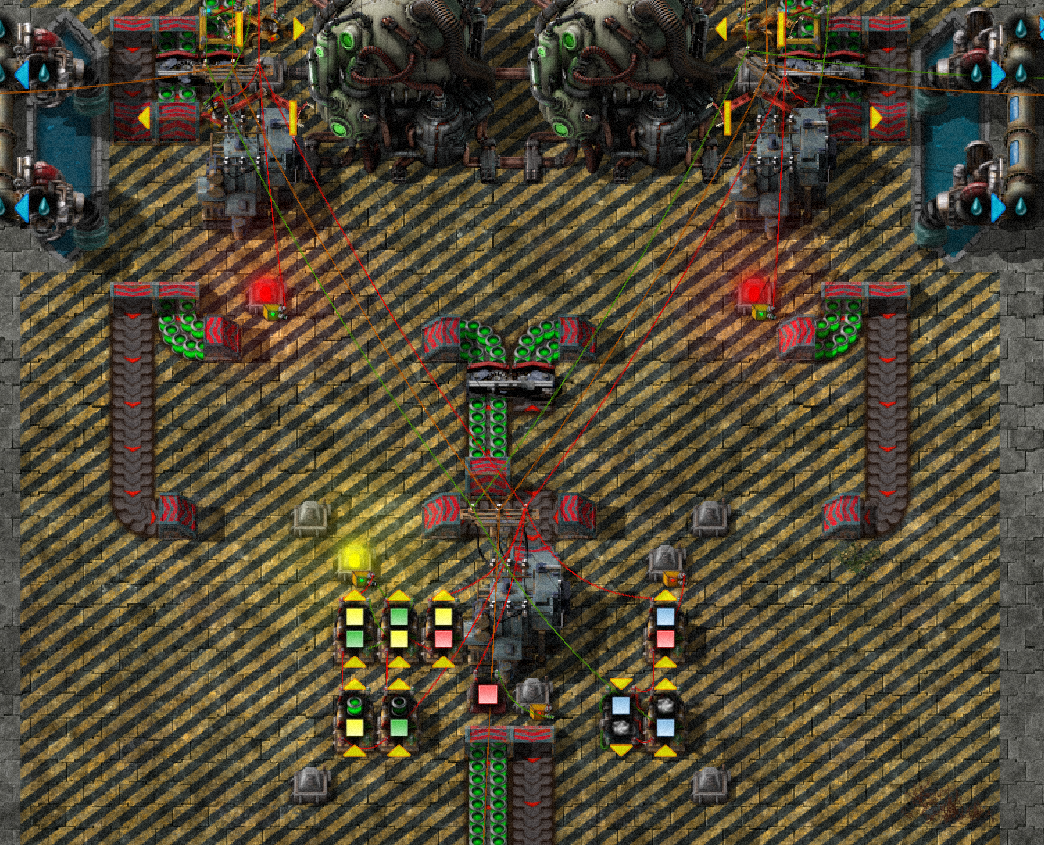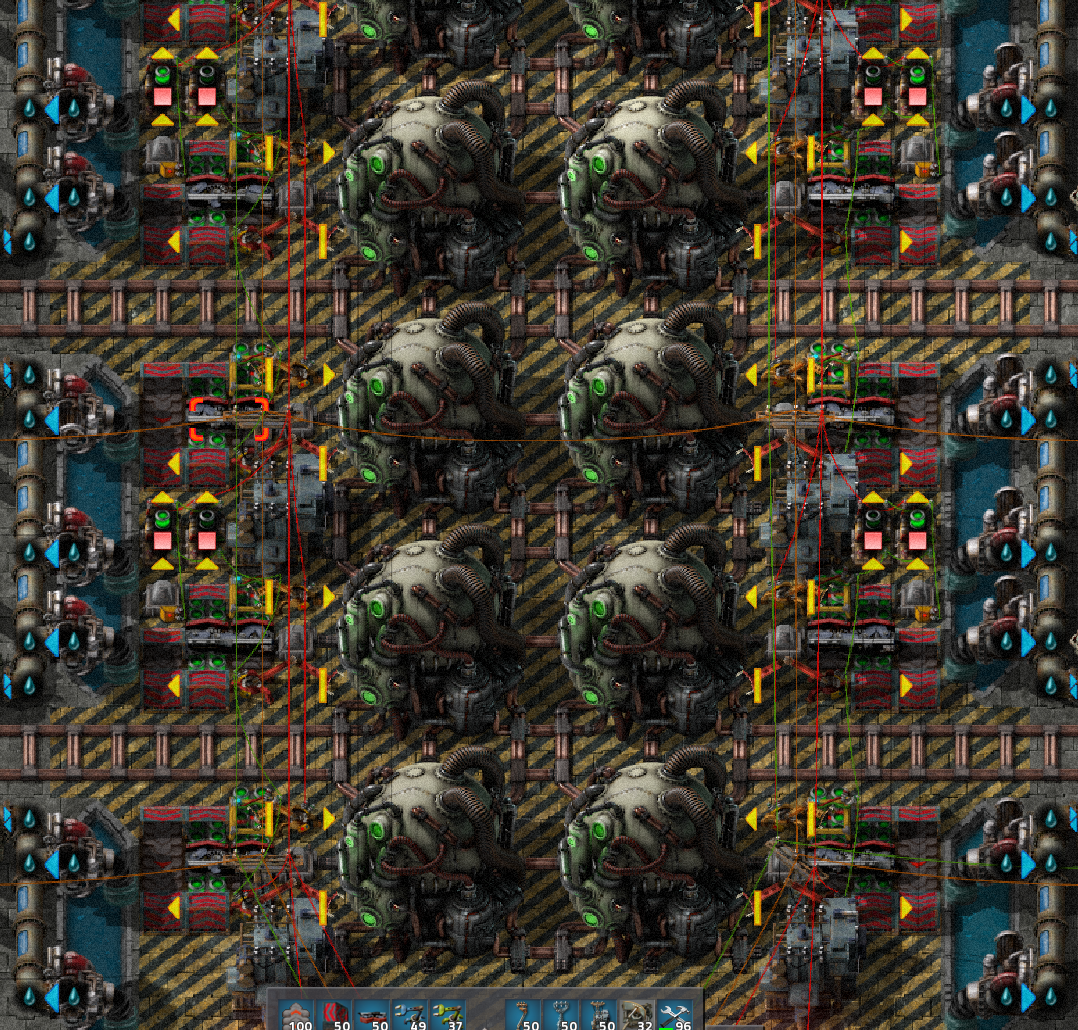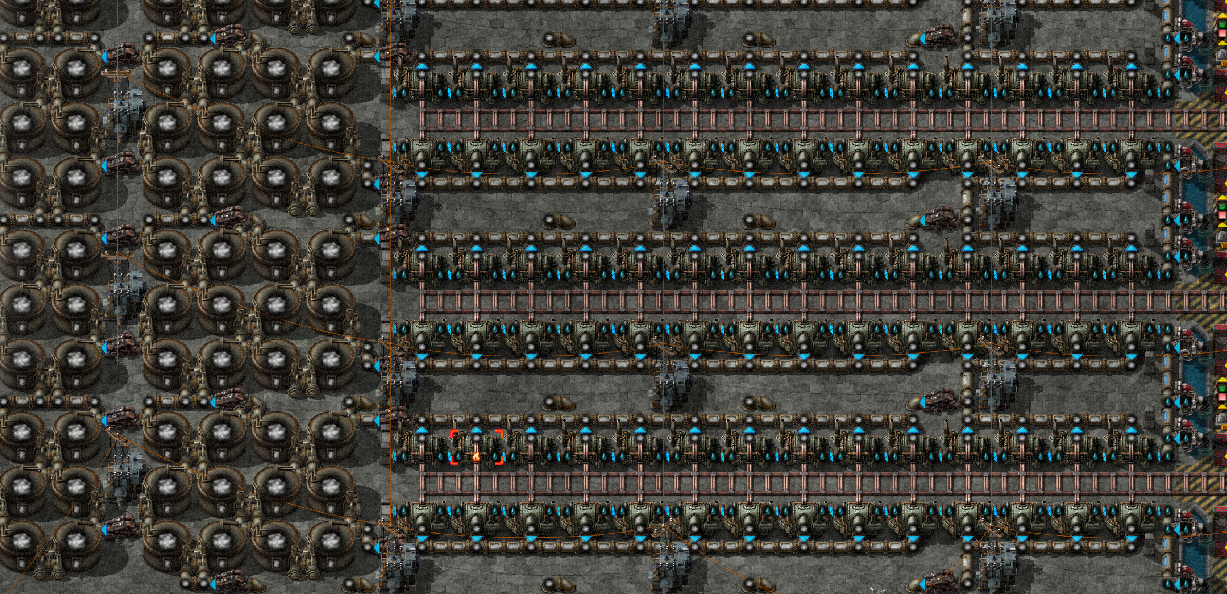- Tileable design expandable into infinity as long as terrain permits
- Requires landfilling. Works well with tall but narrow stretches of water.
- Throttled design, reactors will only be active when more steam production is needed.
- Production: 640MW per 4 reactors, 560MW drained by heat exchangers per full row.
- No bots (for logistics). Belts only.
It's been a while! The last reactor design I tried broke with the water barreling not working well anymore - and I wasn't happy with it anyway. So, back to the drawing board!
I've encountered several problems when making nuclear reactors:
- Heat exchangers now need to be close to the reactors. At a not-so-insignificant distance they just never activate anymore, even when the reactors are at 1000 degrees.
- Water supply is continuous and high volume. Steam output is continuous and high volume. Both of these facts limit the amount of piping you can do.
With these limitations the only logical way to make an infinite tileable design is to put the water pumps into the plant themselves. Which means shaping the terrain to fit the design. Yes, landfilling required, but I've tried to keep it managable by having the water sections close together, near the reactors.
Overview

This overview is of a ~25GW power plant, which is currently handling the bulk of my base's power demands. Fuel is brought in by rail, spent fuel is pushed out by rail. Around the edges there's still a "scaffold" of roboports that I forgot to clear - these were used to have bots build the incremental rows automatically. And place the concrete.
Reactor Controls:

Reactor controls, rather spartan I suppose but they do what they need to.
On the left we have a simple latch that gets set when fuel is inserted, and gets cleared when the reactors eject their spent fuel cells. While the latch is set, the reactor controls get sent a Red signal. This state is signalled by a yellow light.
On the right we have a levelbased control that gauges steam in the first row's steam tank (which is generally the lowest as it's fed from the bottom row which has slightly less heat available due to the lower neighbour bonus at the edges). While there is sufficient steam, the reactor fuel inserters are blocked by the Red signal, and a Blue light signals this state.
In the middle there's a constant combinator that can be set to manually block the fuel inserters. A Red light signals that state.
Fuel input and Spent Fuel output is also delivered here by red belt. I used red belts since using blue is overkill here. You'd need to require upwards of 1 TW before you'd run into belt capacity issues.
Reactor row:

Reactor design, rather straightforward. Long inserters for spent fuel ejection. These block the fuel inserters as long as any one of them is not able to get rid of that spent fuel cell. Since all of them are synchronized, there should never be a blockage if you have something pack up spent fuel at the end of the belt. The splitters break off a small portion of fuel, and the belts are measured to check if there's sufficient fuel to feed each generator. If not, the entire plant is held until fuel supply is restored. The thought behind this is to ensure that the entire reactor remains synchronized. Every reactor inserts and ejects fuel at the same time. The yellow inserters are set to a stack size of 1.
You can also see the placement of the water pumps here. The basic landfill pattern for this reactor design is: Land - 2 Water - 18 Land - 2 Water - Land. Any lake that's 22 water wide and any length can be used (in vanilla) to make this power plant work.
Heat exchangers:

Just showing the left side, the right side is a mirror image of this. To get around flow limitations, the water pumps are practically glued onto the heat exchangers. The double row of heat pipes is not arbitrary - it's needed to ensure that the final 2 heat exchangers get sufficient heat once the reactors near 850 degrees. Water and heat from the right, as close to the reactor as I could manage it. Steam exits to the left into a large buffer. The buffer is split into 2 sections because flow between the tanks wasn't working when you've got 6 in a row. The first buffer takes steam from the heat exchangers, and should suffice to buffer an entire reactor cycle if the plant is drawing at least 20% of max capacity. The second buffer feeds the turbines and should frankly, never be empty. There are 3 paths from reactor to the steam buffer. This was needed because 2 will run you into flow capacity limits, even with pumps.
Turbines:

Pretty straightforward a triple row of turbines with some interruptions for substations to pull the power. You may notice that the substations from the pumps and the ones touching the turbines do not interconnect. This is by design for players who want to have the reactor controls and steam feeding devices on a separate circuit with backup power in case of blackups, for easier recovery. I've never found it neccesary... the only realistic way where the plant could fail, fuel starvation.
If you want to be able to consume slightly more steam then the heat exchangers produce, add one more turbine at the end. The strings posted generate 556MW of power for 560MW of heat exchanger steam production for 640MW reactor energy generation.
Failure modes:
- Overload: Plant produces maximum power, periodically still stalling since the reactors will generate more heat then the turbines can consume. It'll produce the maximum amount of energy the turbines can produce, and as long as the fuel inserters keep working, the plant should operate normally.
- Underload/no load: Plant shuts down once the steam buffer is above the treshold. If the turbines aren't producing power, reactors should stay at around 850 degrees when the fuel cycle ends.
- Fuel starvation: Plant will stop the reactors if there is insufficient fuel to fully fuel all rows. As soon as fuel is resupplied, it'll start working again.
- Spent fuel backup: Plant will stop the reactors if the spent fuel cannot be dropped from the inserter onto the belt. Once all inserters are able to dispose of the spent fuel, reactors will be ready again.
- Water shortage: Does not happen, since the pumps don't need power and are integrated in the design.
Hope this'll be of use to someone. This is a design meant for power-hungry megabases, for loads of more then 1.5GW, with no real upper limit. The tileable design also makes it expandable - power production becoming an issue? Add another row, and you've got 560MW more to play with. There is also some room between the steam tanks and the turbines to add a radar if you want to be able to remotely view your power plant.
One word of warning though: Nuclear power isn't UPS friendly compared to solar. Even idle a big nuclear facility can put a dent into your UPS.




